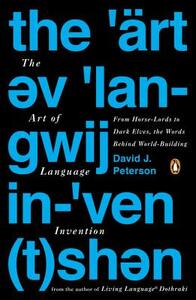You need to sign in or sign up before continuing.
Take a photo of a barcode or cover
200 reviews for:
The Art of Language Invention: From Horse-Lords to Dark Elves, the Words Behind World-Building
David J. Peterson
200 reviews for:
The Art of Language Invention: From Horse-Lords to Dark Elves, the Words Behind World-Building
David J. Peterson
This is a thorough and creative book. It's like an entire intro linguistics course in one sitting. I loved the examples which came from natural and invented languages around the world. I actually think this could make a pretty good textbook. I mean it would be a heck of a lot more interesting than some of my intro books.
A really interesting book. I imagine a lot of the content would be included in a linguistics course. As a person that hasn't taken such a class, there was a lot of new information. I love to learn about things and now I know a lot more about English and Korean. King Sejong was much more of a genius than I was giving him credit. Unfortunately Korean was not mentioned a single time in this book. I really wish Mr. Peterson had talked about it a little bit, especially since it's so different from English. I'm also interested in the creation of a new language and the idea of a "perfect" language. Unfortunately, I didn't have a strong relation to the languages the author has created, so near the end of the book I was a little tired of the comparisons he made to his constructed languages. I will read it again just since it was so dense with information and I recommend it to anyone who has an interest in language.
Peterson's knowledge and creativity are on full display here; if you're part of the niche audience looking for a guide to linguistics as well as a beginner's guide to creating language, this is the book for you.
This was a fun read, and could be a nice sneaky introduction to linguistics/typology for a non-linguist. Most of the book is "review" if you're already a linguist, though not without value - I definitely noted a bunch of examples from both real languages and conlangs to incorporate in intro ling courses, and the book reminded me about a bunch of things I had forgotten from undergraduate typology class. But the case studies describing how Peterson created certain aspects of his various conlangs (the verbal system of High Valyrian; Dothraki phonology, etc) were really interesting - basically, he doesn't just create the current form of a language, but first creates a proto-language which he then "evolves" through several stages according to known/common trajectories of language change (and also taking into consideration social facts about the fictional speakers!), to end up with very naturalistic systems (i.e. systematic but showing (diachronically) principled irregularities/exceptions). Good stuff!
Lands immediately in my short list of Favorite Books Ever.
Psst, don't tell anyone -- but you're reading a linguistics textbook! Everything from allophones to exponence to ergativity to pragmatics -- but it's super-fun and carries you along. Yes, there are Dothraki and High Valyrian examples -- and plenty of context about natural languages as well. Peterson carries off helping you understand linguistics in detail without making it feel like work.
Psst, don't tell anyone -- but you're reading a linguistics textbook! Everything from allophones to exponence to ergativity to pragmatics -- but it's super-fun and carries you along. Yes, there are Dothraki and High Valyrian examples -- and plenty of context about natural languages as well. Peterson carries off helping you understand linguistics in detail without making it feel like work.
As a language nerd, one of the benefits of this book is someone explaining Game of Thrones to me in a way that's actually interesting. By learning how to create constructed languages, Peterson gives an overview of world languages. He also has a humorous writing style.
An interesting look at linguistics from the other side, so to speak. Definitely useful if you want to try creating a language but don't know where to start.
The only real downside is Peterson's tendency to get sidetracked by 'humerous' tangents.
The only real downside is Peterson's tendency to get sidetracked by 'humerous' tangents.
funny
informative
This book is both a font of linguistic information, as well as a scratch for the creative itch inside any person curious about constructed languages. This book manages to convey very dense acoustic and grammatical concepts in a way that was both easy to understand and detailed. While previously I absolutely abhorred the phonological aspect of linguistics, I now have a new appreciation for it, and I believe the same will be true for many people. The only fault that I could possibly find in this book is one that's relatively common among philologists, which is the tendency to become overly preachy with regard to the whole prescriptivist/descriptivist debacle. Aside from that speed bump (and I must say it was fairly negligible compared to the rest of the content), I still found this book both informative and enjoyable, something I find harder and harder to say every day.
informative







